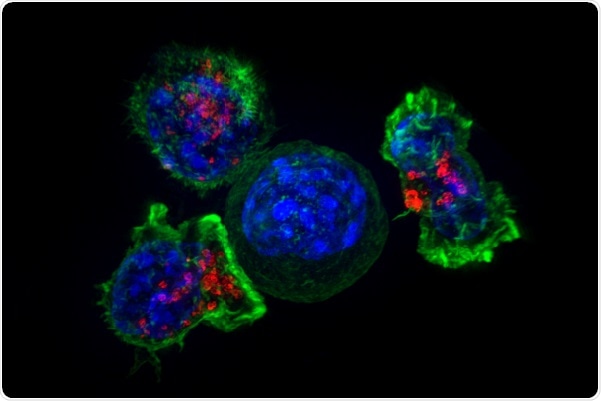Struggling against a tumor is not a sprint. It is a marathon. The race of cancer-fighting T cells is at times simply very long, and the T cells give up fighting. This phenomenon is referred to as T cell exhaustion by researchers.

Superresolution image of a group of killer T cells (green and red) surrounding a cancer cell (blue). Prolonged overactivity of killer T cells summoned to a tumor site can render them useless, a cellular state immunologists call “exhaustion.” Image Credit: National Institutes of Health.
In a new study, scientists from La Jolla Institute for Immunology (LJI) explain that T cells can be designed to eliminate tumors without succumbing to T cell exhaustion. The study has been published in Nature Immunology.
The idea is to give the cells a little bit of armor against the exhaustion program. The cells can go into the tumor to do their job, and then they can stick around as memory cells.”
Patrick Hogan, PhD, Professor, La Jolla Institute for Immunology
The study is based on a decades-long collaboration between Hogan and LJI Professor Anjana Rao, Ph.D. The research has unraveled the vital role of proteins known as transcription factors in the cellular pathway that activates T cell exhaustion.
This study is crucial because T cell exhaustion continues to trouble even the most advanced cancer immunotherapies.
For instance, in CAR T therapies, scientists extract T cells from a cancer patient and “arm” them by modifying the expression of genes that help fight cancer. They leverage special T cells, which then go back into the patient. CAR T therapies are different from immunotherapies, the aim of which is to trigger the existing T cell population of the patient.
T cell exhaustion takes an ugly turn with both approaches. “Many people have tried to use CAR T therapies to kill solid tumors, but it’s been impossible because the T cells become exhausted,” stated Hyungseok Seo, Ph.D., co-first author of the study and a former postdoctoral fellow in the Rao Lab. Seo is now working at Novartis.
The new study handles this issue by offering T cells the potential to fight exhaustion itself. The researchers achieved this by screening T cells to reveal those transcription factors that could boost a T cell’s “effector” program, a key step in preparing T cells to kill cancer cells.
Thanks to this screening process, the researchers found BATF, a transcription factor found to cooperate with IRF4, another transcription factor, to counter the T cell exhaustion program.
Modifying CAR T cells to also overexpress BATF in mouse colorectal carcinoma tumor and melanoma models resulted in tumor clearance without inducing T cell exhaustion. The CAR T therapy was found to work against solid tumors.
“BATF and IRF4 are cooperating to make T cells better,” stated Seo.
Additional investigation revealed that while IRF4 is crucial, it should not be overexpressed to the same degree as BATF. To achieve the most optimum effect, BATF was found to be overexpressed nearly 20 times more compared to normal cells.
It was promising that certain modified T cells also hung around and turned into memory T cells. This is critical as T cell exhaustion usually blocks T cells from setting up a powerful memory response to recurrent cancers.
We didn’t just increase the ability of T cells to fight exhaustion—we increased the ability of cells to fight tumors.”
Edahí González-Avalos, Study Co-First Author, La Jolla Institute for Immunology
González-Avalos is a graduate student in the Rao Lab and headed the bioinformatics analysis for the project.
According to Hogan, overexpression of BATF could be a potential technique for enhancing CAR T therapies and for eliminating certain hard-to-treat cancer types, like pancreatic ductal carcinoma. Such cancers are called “immunologically cold” as they do not trigger a strong anti-cancer response from the immune system. T cells do not combat them by force.
Many other laboratories have been investigating techniques to make such cold tumors “hot,” such that they attract T cells. The LJI researchers propose that a potential approach would integrate those approaches with targeting transcription factors to make T cells exhaustion-proof.
We wouldn’t necessarily need a transgenic approach to do this. Maybe even an oral drug molecule could do it, if you knew what transcriptional pathways you wanted to go after.”
Patrick Hogan, PhD, Professor, La Jolla Institute for Immunology
The team highlights that BATF is only one of the various transcription factors that could be crucial to manipulate while resisting T cell exhaustion.
“We’re going to keep looking for answers,” concluded González-Avalos.
Source:
Journal reference:
Seo, H., et al. (2021) BATF and IRF4 cooperate to counter exhaustion in tumor-infiltrating CAR T cells. Nature Immunology. doi.org/10.1038/s41590-021-00964-8.